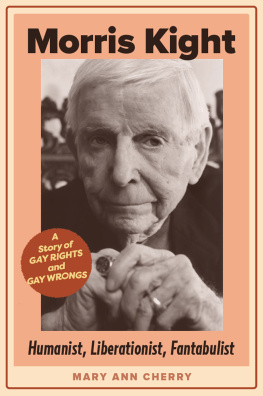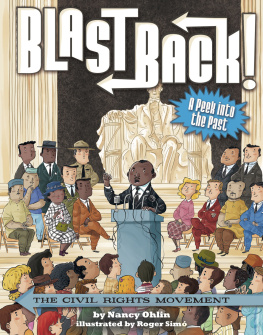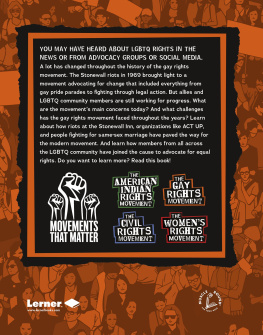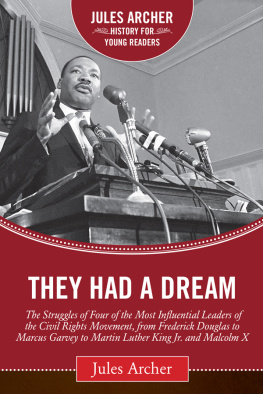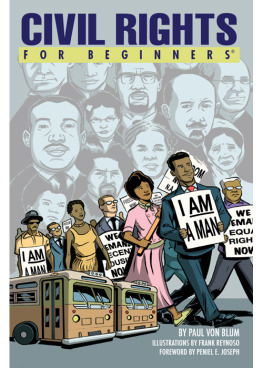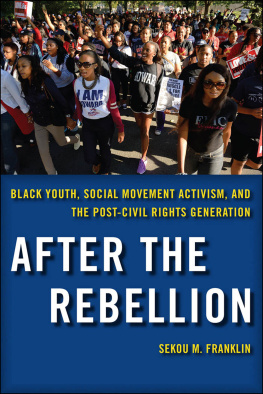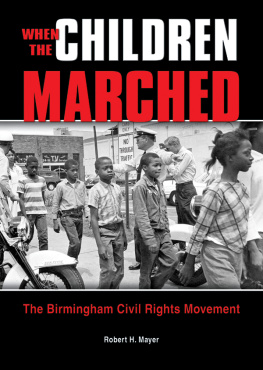
MORRIS KIGHT
HUMANIST,
LIBERATIONIST,
FANTABULIST
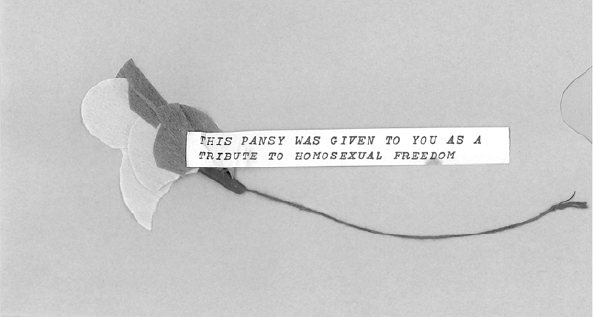
Morris Kight: Humanist, Liberationist, Fantabulist A Story of Gay Rights & Gay Wrongs
Copyright 2020 Mary Ann Cherry
All Rights Reserved
Process Media
1240 W Sims Way #124
Port Townsend WA 98368
EPUB ISBN: 9781934170823
Printed in the United States of America
10 9 8 7 6 5 4 3 2 1
MORRIS KIGHT
HUMANIST,
LIBERATIONIST,
FANTABULIST
A STORY OF GAY RIGHTS & GAY WRONGS
MARY ANN CHERRY

This book is dedicated to:
The Underdog:
The undermined and the underappreciated.
To every eccentric, black sheep, misfit, reject, and loser, to the odd duck, the quirky, the loner, the lost, the ignored, and the forgottenthis is for you.
If one young homo or queer gets one thing out of this book, any little scrap that might inspire or motivate them, then I will have lived a purposeful mission.
The research for this book was made possible by generous support from:
John E. Donaldson and Dennis J. Perkins Foundation
James C. Hormel, EQUIDEX
Thomas J. Dodd Research Center
AIDS Healthcare Foundation
BY AL MARTINEZ
Introduction

O N A COLD and rainy day in December 2002, I visited the legendary gay activist Morris Kight in his hospital room at Cedars Sinai Medical Center in Los Angeles. He was quite cheerful despite his recent medical prognosis that he was at the end of his life. After a few minutes of pleasantries, in true form he wanted to get down to business. Specifically, he wanted to sign the most recent codicil to his will. I asked a mana stranger who I saw in the hallwayif he had a moment to act as a witness to this. He kindly agreed and, with his young son in tow, followed me into Morris room.
Morris was sitting up with his legs and feet dangling over the side of the hospital bed, the sheet covering most of him. He was able to maintain his venerable presence even with a nose tube and an IV. In his usual regal manner, he introduced himself: Hello, Im Morris Kight. People who did not know Morris would sometimes mistake him for nobility, or a business mogul. With his controlled air of authority and mysteriously powerful persona, he could also pass for an eccentric underground mob boss.
As he and the stranger wrote their signatures on multiple papers, Morris, exercising his natural curiosity about people, focused his questions to the mans son. He asked the youngster about his studies, his interests, and if he liked what he was learning in school, and Morris concluded with the bonus question: What are your dreams? Morris showed genuine interest and encouraged the young boy to go after what he wanted in life. He advised the youngster to go for it, all goals were achievable; dont let anything interfere with them.
When all the signing formalities were completed, an odd thing happened. The boys father shook Morris hand and then he took my hand, held it, and looked me directly in the eye and thanked me with great sincerity. I knew the man was not offering thanks for being randomly asked to do a favor. Instead, it was apparent he was grateful to me for bringing his child into this gentlemans room to spend a brief moment with this stranger of strangers, one who so quickly had touched these good people.
That was the magic of Morris Kight.
I knew Morris personally. For the final ten years of his life, I helped to prepare and fax many of his missives and correspondence. Sometimes he introduced me, in his most imperialistic tone, as a fahn-tas-tic typist. (I still cringe.) I was familiar with the 6 a.m. phone calls that many people whom I interviewed also had experienced. The phone would ring at 6 a.m., and a chipper Morris Kight would be on the other end of the linewith hardly a courtesynarrating the days agenda, all of which would be news to me. He would begin by making a statement about something that needed to happen that day, under his direction, as a priority, and then give me just enough time to agree or disagree to join his magic carpet ride for the day. And just as quickly, the phone line would die. Where there once was the sound of Morris Kight, there was silence. He hung up as soon as business was completednary a goodbye. He was too busy going down a list, written on a yellow legal pad, getting about the days business of righting wrongs and changing the world.
Later, I became the ride who, like so many different people, transported Morris Kight to where he needed to be on a daily basis. Following the list on the yellow legal pad, Morris would direct the day and do his many errands. He liked to hand-deliver certain messages to peoplehe felt that it made an impact.
Often we had lunch. We talked about everythingpolitics, men, relationships, family, a little gossipalways peppered with his tales of olden times. He told me many stories, a good number of which are included here. Morris often talked with specificity about his early life in Texas. He felt very affected by it, and yet he never dared a complete analysis of himself. I could almost envision a mini-version of the grown-up Morris Kight moving through the crude, macho world of east Texas in the early 1920s with his perfect posture and elocution. He was, by his own admission, an odd kid.
He once told me about the phony turquoise jewelry that he had learned to make from the natives in New Mexico. (No one ever got the exact arcane recipe from Morris.) For many years, he bought and sold legitimate antiques and artifacts; yet at times, he supported himself selling these faux pieces too. (He assessed my own turquoise jewelry to be of ehhx-cellent quality and quite auhhh-thentic, my dear.) He could spot a phony gemstone, or person, from across a room. Of course, some people who knew Morris might say, It takes one to know one.
In the course of researching this book, as expected, I came to know and understand Morristhe man, the liberator, the negotiator, the media genius, and the egomaniacmuch better than I had gotten to know him during those lunches. I always sensed that he was a complex individual, but I had no idea what was in store for me.
It turned out my gut feeling was correct; he had been sitting on a great story. The fact that he was an innate radical was no surprise. Morris was not a weekend liberal who facilitated a grassroots movement once or twice in his life. No, Morris was a lifelong activist dedicated to the bigger, grander cause in the name of good, and none of this was news.
Kight, the grand panjandrum of gay liberation, was indeed a complicated character. In some circles, he was known as an egotist. Meanwhile, right down the street is another group of people who would describe him as a Gandhi-like godfather. Some people I spoke with about him simply needed to vent. Others gushed. A few people refused to speak to me at all. His self-importance is legendary even without this biography. Yet some of his worst and most appalling qualities served a broader purpose and benefited many peoplewhile at the same time serving to beef up the profile of Morris Kight. None of this was new information.
As much as possible I have left Morris own words intactincluding his affected articulation, Edwardian enunciation, and seemingly run-on sentences. His impeccable use of the English language and inflection in his speech is significant; there is not a trace of a small-town Texan drawlunless he chose to use it for emphasis (and then it was without a doubt an authentic, poor dirt-farm twang). His stories offer not only an amazing accounting of the time (his history is solid) but conjure up a complete picture of the young Morris who showed an awareness of the world around him, while also providing a glimpse of how he viewed himself. Morris perception of himself is always paramountvacillating between shades of Oliver Twist and Quentin Crisp. What finally struck me was that Morris never dropped his guard. He never, ever fully revealed himself, even when he was most vulnerableand he certainly never attempted an honest and humble assessment of himself.
Next page
